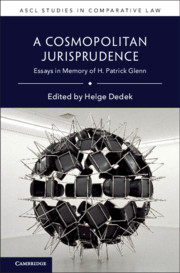Book contents
- A Cosmopolitan Jurisprudence
- ASCL Studies in Comparative Law
- A Cosmopolitan Jurisprudence
- Copyright page
- Epigraph
- Contents
- Foreword
- Acknowledgements
- Notes on Contributors
- Images
- Introduction
- Part I The Tradition of Comparative Law
- Part II The Concept of Tradition
- Part III Crossing Boundaries
- 11 The School of Salamanca: A Common Law?
- 12 The Un-Common Law
- 13 The Fabric of Normative Translation in Law
- 14 Statehood as Process: The Modern State Between Closure and Openness
- 15 Cosmopolitan Attachments
- H Patrick Glenn Publications
- Index
14 - Statehood as Process: The Modern State Between Closure and Openness
from Part III - Crossing Boundaries
Published online by Cambridge University Press: 10 December 2021
- A Cosmopolitan Jurisprudence
- ASCL Studies in Comparative Law
- A Cosmopolitan Jurisprudence
- Copyright page
- Epigraph
- Contents
- Foreword
- Acknowledgements
- Notes on Contributors
- Images
- Introduction
- Part I The Tradition of Comparative Law
- Part II The Concept of Tradition
- Part III Crossing Boundaries
- 11 The School of Salamanca: A Common Law?
- 12 The Un-Common Law
- 13 The Fabric of Normative Translation in Law
- 14 Statehood as Process: The Modern State Between Closure and Openness
- 15 Cosmopolitan Attachments
- H Patrick Glenn Publications
- Index
Summary
In Patrick Glenn’s The Cosmopolitan State, the reciprocal relationship between ‘elements of closure’ and the ‘cosmopolitan way’ plays a central role. The goal of this chapter is to adopt his perspective on such tensions within statehood, in order to illustrate and concretize their reciprocal relationship in three areas: ‘knowledge’ and its generation and dissemination, ‘sovereignty’, and ‘citizenship’. These areas mirror the elements of closure identified by Glenn, namely, ‘boundaries’, ‘hierarchy’, and ‘writing’. Transposing these elements in such a manner helps to illustrate the sequence of processes that limit a cosmopolitan opening up of states. In all three examples provided, the actual ‘driving forces’ of ‘elements of closure’ are nationalization processes, whether this involves the nationalization of knowledge or the legal notions of sovereignty and citizenship, which function as indispensable requisites for the self-interested life of the nation state. With the processes of progressive economic interdependency, along with the increased mobility as a result of the development of transport and communication technology and transnational migration, these protective walls of national statehood have come under ever-increasing pressure. Ultimately, however, as this chapter will show, it took the idea of human rights as a globally valid legal concept to bring this bastion down.
- Type
- Chapter
- Information
- A Cosmopolitan JurisprudenceEssays in Memory of H. Patrick Glenn, pp. 267 - 279Publisher: Cambridge University PressPrint publication year: 2021

